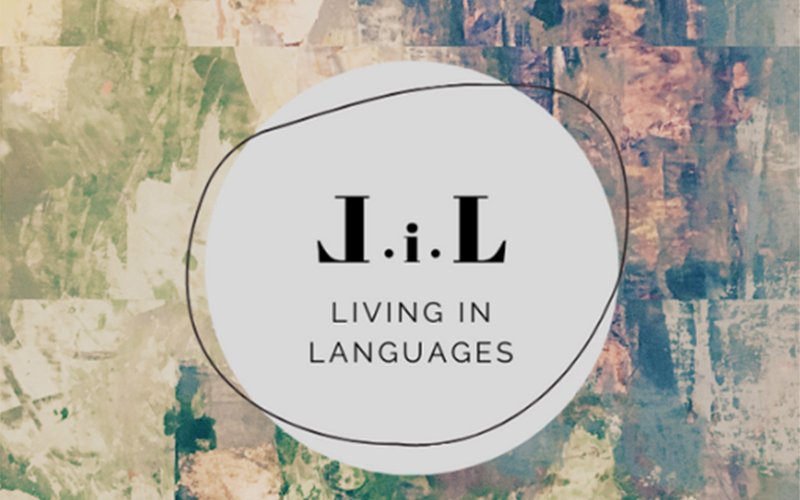Graduate Students Bring a Living in Languages Journal to Life

ALBANY, N.Y. (Feb. 22, 2022) — A new online, open access, peer-reviewed journal guided by doctoral students and devoted to translation studies is capturing worldwide attention less than a month after its release.
A collaboration between the departments of English and Languages, Literatures and Cultures (LLC), the Living in Languages Journal has already been downloaded 183 times from 17 institutions in 17 countries.
Its editorial board’s senior editor is Andrew Brooks, whose introduction weaves together a volume that contains essays from three English PhDs, two graduate students from India, and a professor and Visiting Scholar from Alicante, Spain:
- “The Queer Lover, the Most Lonesome Fragment: Understanding ‘Love’ Through Loss in A Lover’s Discourse, Fragments,” by English PhD candidate Nicole Cosentino.
- “Translating the Poetry of Leena Malhotra,” by Komal Agarwal, University of Delhi, India.
- “Rewriting and Retranslation in Fernando Arrabal’s Exiled Cinematic Memory,” by John Douglas Sanderson, professor, University of Alicante, Spain.
- “Perpetual Emergency: The Self, Translation and Border Crossing,” by Umar Nizar, University of Calcutta, India.
- “‘Tea, with Roti and Butter, Mister?’ An Examination of a Single Phrase in a Sentence from Finnegans Wake,” by English PhD student Sudarshan Ramani.
- “Translations of Mohamed Sehaba,” by English PhD candidate Yolande Schutter.
- “Intentional Entanglement” by English PhD candidate Andrew Brooks.
A Growing Living in Languages Project
The Journal is the culmination of a process that began less than a decade ago when academic exchanges in translation studies were established between the English department and China. The resulting Visiting Scholars Series, hosting Chinese and then Spanish academics, became the first phase in the Living in Languages project.
Then, in 2018, the desire to connect the visiting scholars with UAlbany students for exchanges of views resulted in a yearly Living in Languages Colloquium, directed by Associate Professor Helen Elam of English in 2018; she was joined by Associate Professor Ilka Kressner of LLC in 2020.
“The Colloquium has been fueled by a Planning Committee constituted by UAlbany graduate students — currently Andrew Brooks, Rumi Coller-Takahashi, Nicole Cosentino, Caitlin Fanning, Anastasios Karnazes, Nerisha de Nil Padilla Cruz, Yolande Schutter and Sarah Zahed — whose dedication and energy have become its very lifeline,” said Elam.
Translation as a Vehicle to Transform Literary Language
The third and crucial step — the creation of the Living in Languages Journal — was undertaken by Brooks, who is now working on a PhD dissertation on translation as a performative event. Elam said this work “ripples across politics and aesthetics. Andrew has a sense of translation not as a mere conveying of meaning from one language to another, but as an event that has the power to transform both the original and the target language.”
She adds: “Andrew had the imagination to take what was there — visiting scholars and a yearly colloquium — and create from it a really valuable space where graduate students in two departments, along with visiting scholars, could meet on the page, and, as needed, even make use of that space as a workshop toward publication.”
Brooks, who presented at the Colloquium in its first years, said, “I became interested in translation and commentary as a form of literary criticism for rhetorically performative texts and as a performative form of literary research in its own right, which touches on the entanglement of politics and aesthetics.”
In 2019, Brooks contemplated the idea of an academic venue on campus for the development and eventual publication of research on translation. He broached the subject with fellow PhD candidate Sarah Zahed and they put the Journal in motion, enlisting University Libraries, reaching out to potential authors and forming an editorial board drawn from Colloquium Planning Committee members, including Padilla Cruz, Schutter and Cosentino, with Elam and Kressner as executive advisors.
“As the project unfolded, we gained more amazing readers and editors,” said Brooks. The first submissions were from what he calls “UAlbany’s Living in Languages bunch” and visiting scholars, but then submissions were opened to all colleagues working on translation. Editors and advisors read through each submission, discussed strengths and weaknesses, and offered revision suggestions.
The result was the first Journal issue, which opens with a painting by Zahed and features seven essays that provide both range and focus. “Our selections for this inaugural edition are brought together not out of unity of thought, or goal, or belief, but as an attempt at a strange symposium,” writes Brooks in his introduction.
The 2022 Colloquium will take place March 23 – 24, and the Living in Languages Journal will be accepting submissions for its second issue shortly after.




